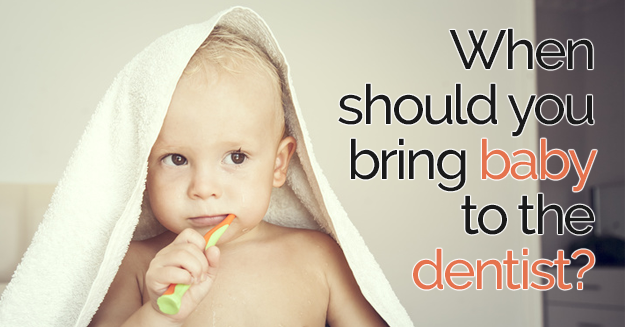
First tooth … first birthday.
That’s the guideline parents are usually given when they ask how early to bring their child to the dentist.
In our practice, we want to see 1-year-olds, too, but we probably won’t do a full examination then unless the parent has a concern. True dental care starts around age 2.
That doesn’t mean there’s no value to seeing the child early – there is. Dentists and their offices can seem scary, and acquainting the child with us will reassure him there is nothing to fear the next time they come in for a full exam. We make that first visit relaxing and fun, and do a gentle check of the child’s mouth while he’s comfortably snuggled in a parent’s lap.
We also use that visit to educate the parents about early dental care. Preventive steps taken when the baby is small can mean fewer problems as he matures.
Here are some ways to ensure good dental health for your child:
Don’t put the baby down with a bottle. This is the number one cause of tooth decay in small children. Letting the child fall asleep with a bottle of sweet juice or milk – which contains lactose, or milk sugar – allows the sticky, plaque-causing sugar to remain on the teeth and eat away the enamel. Going to sleep with bottles of water may not cause decay but can lead to other problems. It is best not to get the child used to bottles at bedtime.
Be sure your baby has a source of fluoride. Some communities put it in the water. If yours doesn’t, we recommend you use supplements, which are available only by prescription. Although some parents worry about giving their child fluoride, the mineral has been shown to strengthen tooth enamel, thereby helping prevent decay. Fluoridated water contains only one part per million of the chemical, too low to be harmful, but that tiny amount makes a big difference in preventing cavities. The benefits of fluoride begin even before the teeth erupt.
On the other hand, be sure your child isn’t getting too much fluoride. In some communities, the water is naturally fluoridated above two parts per million. At this concentration in children whose teeth are still forming, enamel fluorosis, or mottling, can occur. These children should be given an alternate source of drinking water until their permanent teeth are formed, around age 8.
Begin brushing your child’s teeth as soon as they come in. Not only does this help prevent cavities, but it models and teaches good behavior that then becomes part of the daily routine. Before your baby’s teeth erupt, clean her gums with gauze and plain water.
Don’t ignore the primary teeth. Just because they will fall out doesn’t mean they aren’t important. They are essential for speech development and to help the child chew properly. They also act as placeholders to guide the permanent teeth.
If you have an infant, we do want to see her by her first birthday just to make sure her dental health is on the right track. If everything looks fine, we will expect to see her again when she turns 2.
Don’t put off your child’s dental care, because good dental habits should be formed early and cavities can begin as soon as a tooth erupts.